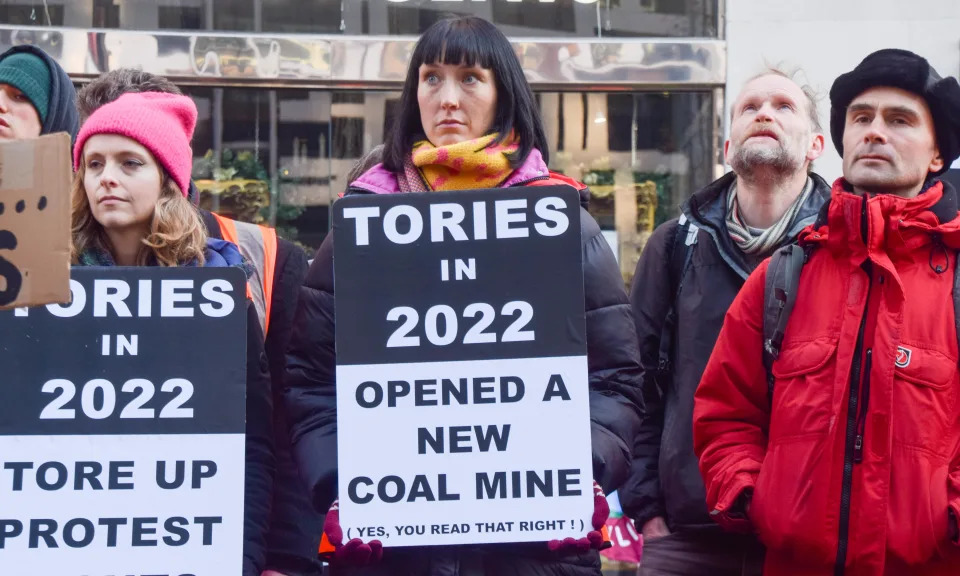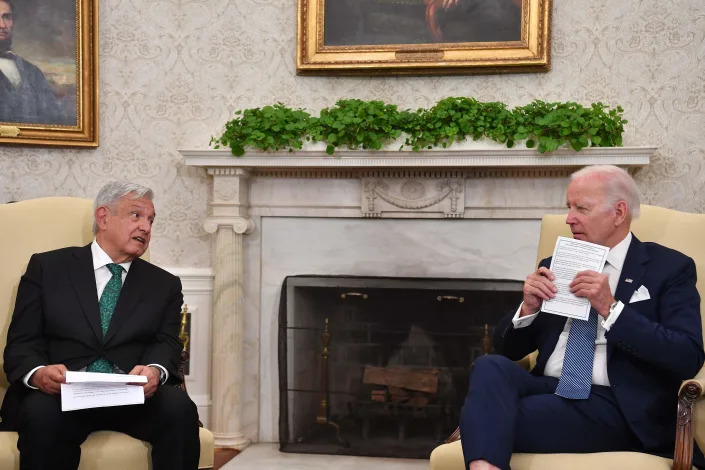Helena Horton and Fiona Harvey
Thu, 12 January 2023

Rishi Sunak has been criticised by his own net zero tsar, who says the UK risks missing its green targets due to inconsistent policies and lack of commitment to pledges.
In his net zero review, seen by the Guardian, Chris Skidmore said a large barrier to renewable energy was a lack of confidence in the government, which has inconsistent policy support for green energy, with measures such as Sunak’s new electricity tax.
Skidmore, the Conservative MP for Kingswood, was asked by the former prime minister Liz Truss to write a review on the policy to reach net zero carbon emissions by 2050. He was asked to find out what was working with the policy regarding not putting more carbon into the atmosphere than the UK absorbs, and to make the business case for the goal.
One issue mentioned throughout the report is a lack of policy commitment. Skidmore said: “The overwhelming impression I got was we will make net zero more affordable if we are able to deliver further and faster, which requires certainty and consistency of approach. We need to de-risk investment, which will actually drive down the costs of net zero, and if the recommendations put forward by my review are followed we will create incentives to invest in renewables.
“The review recognises we have fallen behind, but it sets out how we can be world-leading in these areas once again. We need to remove the barriers that are in place at the moment.”
Related: Liz Truss appoints green Tory Chris Skidmore to lead net zero review
Dan McGrail, chief executive of the trade body RenewableUK, said: “Sudden policy changes like the imposition of the electricity generator levy, which kicked in at the start of this year, have put investment at risk.”
Chris Hewett, chief executive of the trade association Solar Energy UK, said: “Skidmore is right to demand the replacement of stop-start policies with certainty for investors.”
Skidmore cited agriculture as one of the main culprits of carbon emissions, and said its share of emissions could, by 2030, grow from 12% to 30%. To encourage people to eat more environmentally friendly foods, Skidmore recommended “eco-labelling” rather than a tax or ban on foods such as red meat.
He also said that farmers had been disincentivised from farming in an environmentally friendly way by the confusion around the government’s post-Brexit nature-friendly agriculture payments, and that there had been missed opportunities for nature-based solutions with most policy focused on woodlands and peatland rather than many other carbon sinks such as wetlands.
In the review, Skidmore called for a stable policy environment, with consistent support for renewables, as well as a reform of the way the government financially helps renewable energy projects to make that more attractive for investors.
But climate campaigners criticised the review for being unambitious and for not calling for strong policies to avert the climate crisis.
Doug Parr, policy director for Greenpeace UK, said: “Whilst there is much useful analysis of the problem the review stops short of recommending the kind of muscular policies that would really drive change towards the massive growth in renewables which will be necessary.
“Without a strong push from government the renewables revolution will still proceed, because the economic logic dictates it should. But it won’t happen at the pace it needs to in order to forestall some of the worst effects of climate change.”
While the review says the UK needs a “rooftop revolution” for solar panels and suggests making planning decisions easier to enable this, it stops short of recommending mandates for solar panels on new builds, or more funding to encourage take-up.
Parr added: “All credible scenarios of our future economy rely on renewable energy being the backbone of the future energy system, and the review should have said government needs to change the remit of the regulator to include net zero delivery, insist on solar panels being on new roofs, expand the scale of renewables contracts and rapidly lay out the location of the offshore electricity grid. Instead, the government seem like a mildly curious spectator, wondering why their aspirations aren’t materialising without ever intervening to make them happen.”
The renewable energy industry has tentatively welcomed the review, with industry leaders saying it contains good ideas that should be adopted by the government.
McGrail said: “If the government is looking to increase the economic benefits of the UK’s decarbonisation ambitions, Chris Skidmore’s review has some really clear easy wins. As he suggests, setting targets for new onshore wind and solar capacity would certainly increase investor confidence, as well as ensuring we can decarbonise our electricity system by 2035.”
He also praised Skidmore for promoting the use of “a wide range of renewables to strengthen Britain’s energy security, including innovative technologies like floating wind and tidal stream”.
He said that he would have liked the review to have told the government to take a “war room” approach to tackling grid connectivity, “with the prime minister bringing all relevant bodies together to address this urgently”.
Hewett said: “We very much hope that Whitehall will embrace his call to establish a joint taskforce with the solar industry to work on a roadmap for reaching 70GW of solar [capacity] by 2035 – about four-and-a-half times what we have now.
“The number-one priority of this group will have to be unblocking access to the grid – which is pushing back the completion of many large projects well into the next decade.”
Polly Billington, chief executive of the UK100 group of local government leaders, said the review showed that local authorities must play a leading role in implementing policy. “This independent review confirms what UK100 has been saying for years: local authorities are the key to achieving the UK’s net zero goals,” she said.
“[We particularly welcome] the recommendation to end the disjointed mess of short-term, competitive local authority funding pots. This move would help communities maximise the economic and social benefits of net zero while making the most cost-effective use of resources.”
Ed Miliband, the shadow climate secretary, said: “Another day, another Conservative MP calling out the total failure of this government over many years to act with the urgency and consistency that the climate crisis demands. Chris Skidmore is right about the fact that 13 years of delay, dither and a refusal to go all-in on a green energy sprint under the Conservatives, is depriving our country of the economic opportunities climate action offers.
“The tragedy is that Rishi Sunak is making things even worse. He is a fossil fuel prime minister in a renewable age who has never understood what this report reaffirms – that going green is pro-business, pro-worker and is a vital part of growing our economy.”
The Department for Business, Energy and Industrial Strategy has been approached for comment.
UK Review Advises ‘Step Change’ in Approach to Climate Change
Ellen Milligan
Thu, 12 January 2023

(Bloomberg) -- The UK needs “a step change” in its approach to slashing carbon emissions if it is to eliminate greenhouse gases by 2050, according to a review commissioned by the government.
The country is not doing enough to invest in projects that benefit the economy and climate, according to the review obtained by Bloomberg ahead of its planned release on Friday. The deployment of green technologies is being held-back by ““a lack of long-term thinking, siloed behaviour from government departments, and uncertainty over the length of funding commitments,” it said.
The review was commissioned in the fall by Prime Minister Rishi Sunak’s predecessor, Liz Truss, to scrutinize UK green policies and ensure they increase energy security and affordability while delivering on a national goal to achieve so-called “net zero” emissions by mid-century. It was prepared by Chris Skidmore, a Conservative former energy minister.
“We must deliver greater certainty, consistency, and clarity across net zero policy making,” Skidmore wrote in his foreword to the 340-page document. “Climate commitments and net zero targets remain just words on a page without a clear, consistent, and stable transition plan.”
Skidmore made 25 recommendations for policies to be advanced by 2025 in order to go “further, faster.” They include legislating to phase out gas boilers for household heating by 2033, setting out a clear roadmap to roll out carbon capture and storage technology and devising a plan for a fivefold increase in installed solar power in the next 12 years.
The recommendations come with the UK already likely to be in a prolonged recession, and Sunak under pressure to roll-out more policies aimed at growing the economy and reducing the country’s energy dependence.
Opportunity of the Century
Skidmore recommended the government publish a financing strategy by the end of this year to show how government spending and policies will be used to help scale up private financing and deliver projects geared toward net zero. He also recommended establishing an “Office for Net Zero Delivery” responsible for putting emissions reductions at the heart of all government policy.
“We have heard from businesses that economic opportunities are being missed today because of weaknesses in the UK’s investment environment,” he said.
Skidmore’s review described the pursuit of net zero as the “economic opportunity of the 21st century,” and said the UK is now at a “crossroads.”
“We can either go further and faster in the transition, capitalizing on our comparative advantages on clean technologies, our world class science base, our global leadership on financial services and the natural power reserves of the North Sea,” it said. “Or we can hold up our hands and say it is too difficult and watch our world-leading sectors, such as the City of London or our advanced car manufacturing, pack up and move on, taking high-skilled, high-paying jobs with them.”
The review identified 10 “missions” for the UK to pursue:
Create a plan to deliver the grid infrastructure needed to accelerate the deployment of onshore and offshore power projects
Ramp up solar power to 70 gigawatts of capacity by 2035, from just under 14 gigawatts now
Work with communities to deploy more onshore wind
Roll-out more nuclear power through a structured program covering the whole supply chain
Invest in long-term carbon-capture and hydrogen technologies
Step up recycling and the reuse of critical materials
Unblock the planning system and hand more power to local authorities
Work toward gas-free homes by 2035
Restore natural habitats
Set a roadmap for research, development and technology with more agile regulation
“When one of the governing party’s own MPs says tackling the climate crisis is the economic opportunity of the century, may we hope that ministers will finally listen” Greenpeace UK’s policy director Doug Parr said in a statement. “We have all seen what our dependence on fossil fuels is doing to our world - from devastating floods and heat-waves to budget-busting energy bills.”
--With assistance from William Mathis.











 France 24US speaker debacle: New Congress marked by deep Republican divisions
France 24US speaker debacle: New Congress marked by deep Republican divisions
 NBC NewsFull Panel: ‘GOP struggles to get its House together'
NBC NewsFull Panel: ‘GOP struggles to get its House together'






